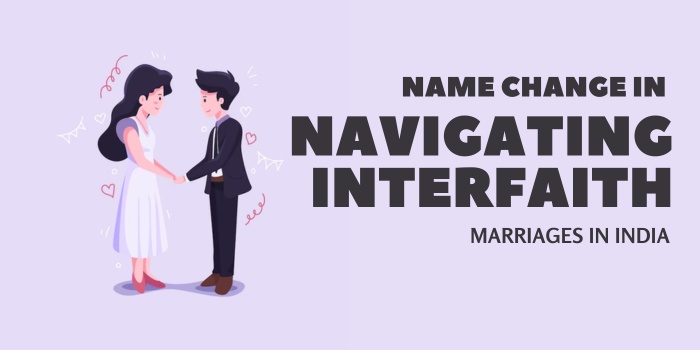Interfaith marriages in India have become increasingly common, reflecting the country's diverse and inclusive society. However, such unions often bring unique challenges, one of which is the issue of name change. In this blog, we delve into the complexities surrounding the practice of name change in interfaith marriages and its impact on individuals and society at large.
Understanding The Significance Of Name Change In India
In Indian culture, names hold immense cultural, religious, and familial significance. They often convey a person's identity, community, and lineage. Traditionally, in Hindu marriages, a woman takes her husband's surname as a symbol of her marital bond. Conversely, in Muslim and Christian marriages, women usually retain their birth names. However, interfaith marriages can blur these established norms, sparking debates over the role of name change.
Challenges And Dilemmas Faced By Couples
- Identity and Autonomy: The question of whether to change one's name or not can lead to an internal struggle for many individuals. Some may feel that adopting their partner's name signifies acceptance and respect for their spouse's culture and religion. On the other hand, others may view it as a compromise on their own identity and autonomy.
- Family and Social Pressures: Interfaith couples often face pressure from their families and communities to adhere to traditional naming practices. These expectations can cause tension within the relationship, raising questions about loyalty and commitment.
- Legal and Administrative Hassles: In India, name change procedures can be cumbersome, involving a series of bureaucratic steps. Interfaith couples may encounter additional challenges due to discrepancies between different states' laws and societal attitudes towards such unions.
Impact On Gender Equality
- Uneven Expectations: The practice of name change in interfaith marriages is often gender-biased, with women expected to relinquish their surnames. This perpetuates traditional patriarchal norms and can hinder efforts towards achieving gender equality in society.
- Shift in Perceptions: Embracing more flexible naming conventions in interfaith marriages could potentially challenge these gender norms. By encouraging both partners to make an informed choice about their names, it may lead to broader discussions about the role of names and identity in relationships.
Legal And Societal Implications
- Marriage and Personal Laws: India's diverse legal landscape means that the rules governing name change in interfaith marriages differ based on religious personal laws. This lack of uniformity raises questions about the secular principles of the Indian state.
- Documentations and Identification: Name change can lead to practical issues concerning documentation and identification, particularly if individuals choose to revert to their original names after marriage. This may result in difficulties with official records and transactions.
Embracing A More Inclusive Future
- Open Dialogue: Interfaith couples must engage in open and honest conversations about their naming preferences and the implications of their choices. By understanding each other's perspectives, they can make informed decisions that honor their individual beliefs while respecting their partner's values.
- Legal Reforms: Advocacy for simplified and uniform name change procedures across all states can alleviate the burden on interfaith couples. Additionally, addressing the gender bias in name change practices could foster a more inclusive legal framework.
- Promoting Cultural Acceptance: Promoting understanding and acceptance of interfaith marriages and diverse naming practices is crucial. Educational initiatives and awareness campaigns can play a significant role in building a more inclusive and harmonious society.
Conclusion
Interfaith marriages in India represent a beautiful amalgamation of diverse cultures and beliefs. The issue of name change in such unions raises complex questions about identity, autonomy, and gender equality. As a society, we must strive to create an environment that respects individual choices while fostering cultural acceptance. By engaging in open dialogues and advocating for legal reforms, we can navigate the challenges posed by name change in interfaith marriages and pave the way for a more inclusive future.


No comments yet